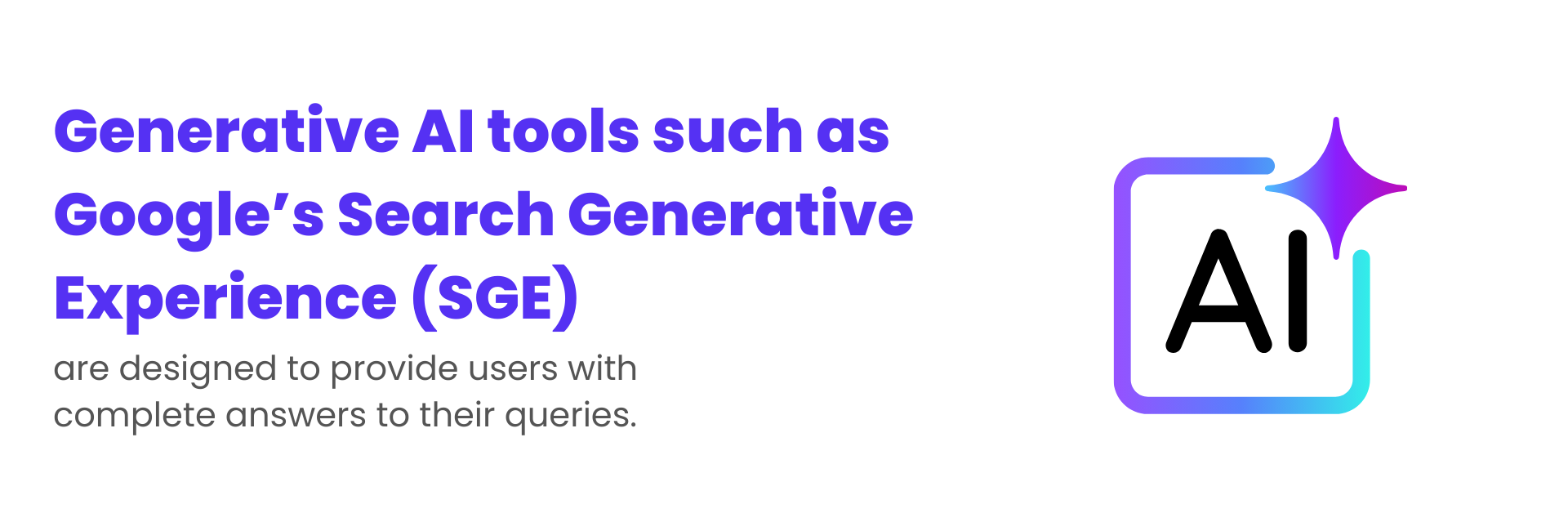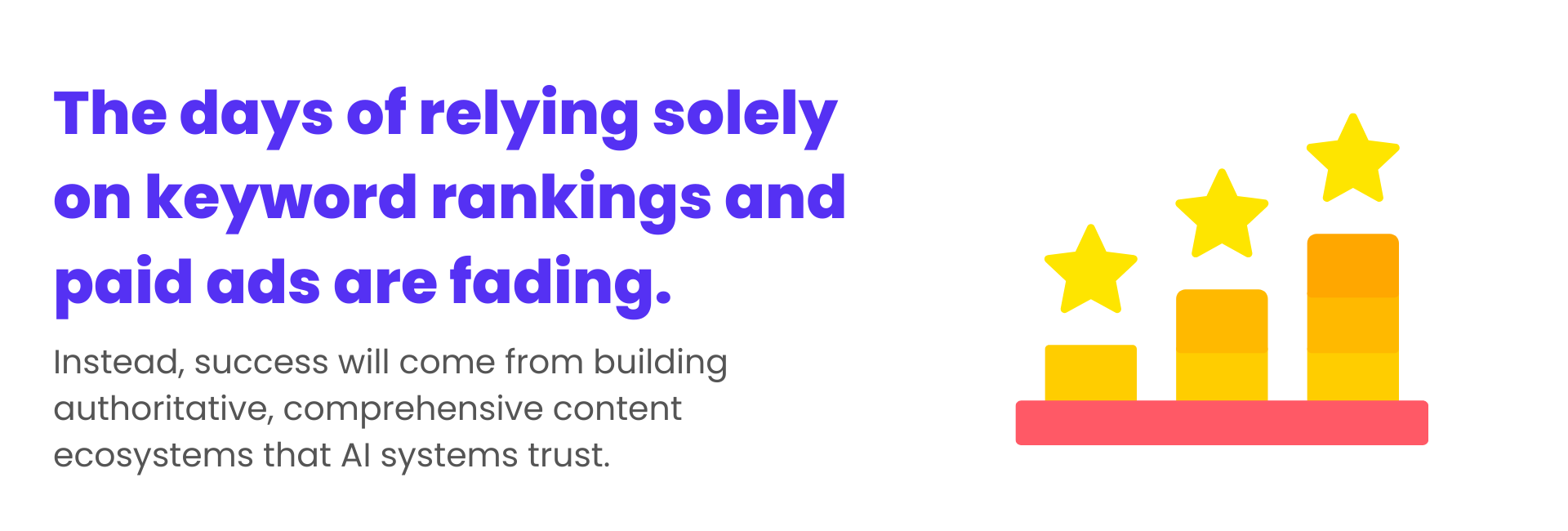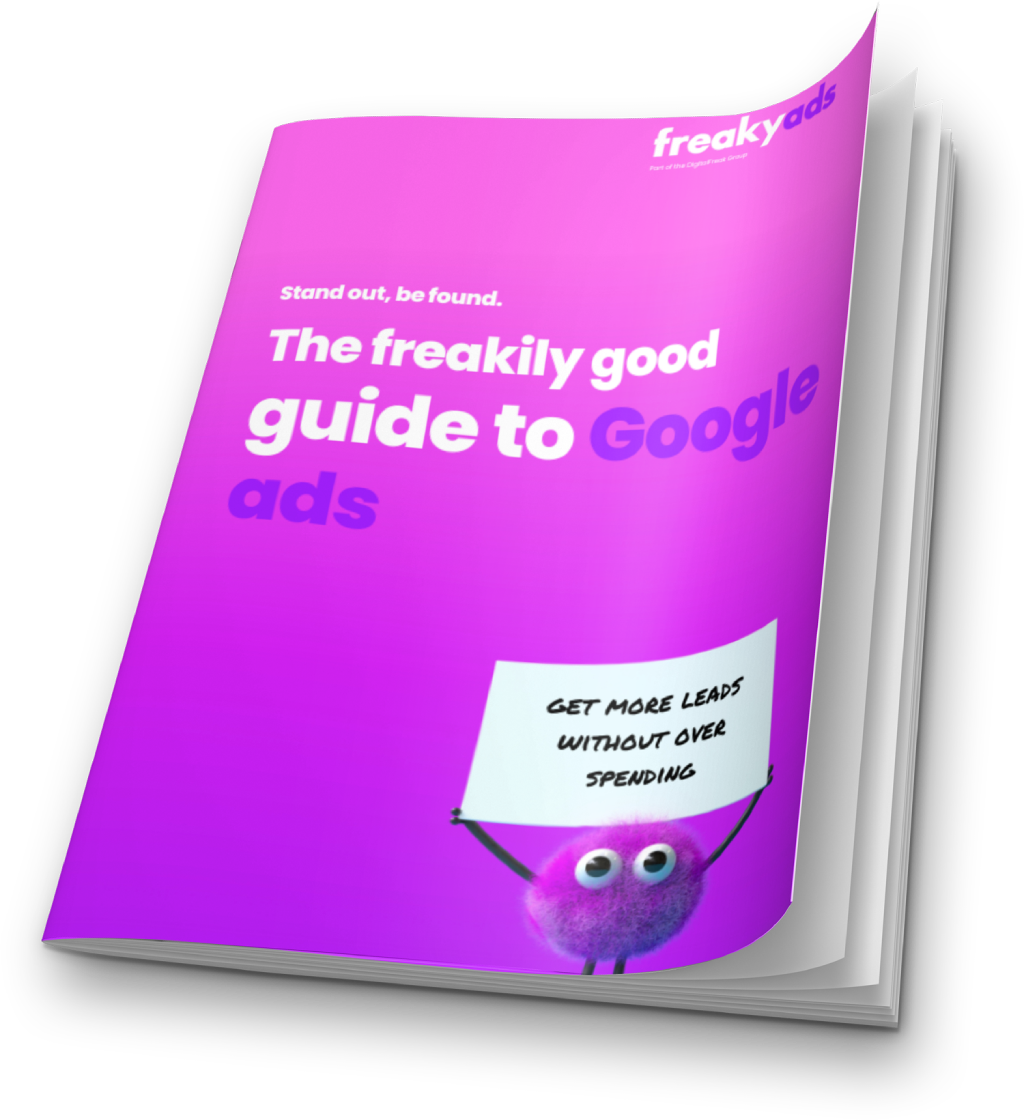Search is changing faster than many businesses realise, and the e-commerce sector sits right at the heart of this transformation. The arrival of generative search technologies from Google, Microsoft, and other platforms has shifted how people discover and engage with online stores. Instead of typing a query and browsing a list of blue links, shoppers are increasingly presented with AI-generated summaries, recommendations, and buying guides right at the top of search results.
For online retailers, this development represents both an opportunity and a challenge. Generative SEO, sometimes called Generative Engine Optimisation (GEO), is the approach businesses need to adopt to ensure their products, content, and brand appear within these AI-powered results. Unlike traditional SEO, which focuses on ranking for specific keywords, Generative SEO requires a deeper, more contextual strategy. It means building content that answers complex questions, provides comprehensive insights, and demonstrates authority in ways that generative engines recognise and promote.
This article explores how generative SEO is shaping the future of e-commerce visibility, what businesses need to know about the technology driving it, and how to adapt strategies today to stay ahead of competitors tomorrow.

Why Generative Search Matters for E-Commerce
Generative AI tools such as Google’s Search Generative Experience (SGE) are designed to provide users with complete answers to their queries. Rather than listing ten websites, these engines can summarise the most relevant information and present it in a conversational format. For consumers, that means less scrolling and more immediate results. For e-commerce businesses, it means visibility depends on whether the AI chooses your brand as part of its generated response.
Consider a customer searching for “best running shoes for flat feet under $200 in Australia.” Traditional search results might show a mix of product pages, buying guides, and reviews. In a generative search environment, the user could be given a curated summary of top products, complete with recommendations, comparisons, and even direct links to purchase. If your brand is absent from that AI-generated shortlist, you lose a high-intent customer before they even have a chance to visit your site.
This shift changes the stakes. Success in generative SEO directly impacts sales because being included in AI-driven results essentially means being endorsed by the search engine.
Should Generative SEO Be a Focus for Small E-Commerce Businesses?
For small e-commerce businesses, competing with major retailers in search results has always been tough. Generative SEO offers a new opportunity to stand out. Unlike traditional SEO, which often rewards brands with the largest budgets, generative search engines value depth, relevance, and expertise. This means a smaller online store that creates detailed product pages, helpful guides, and transparent information can earn the same visibility as a global competitor.
Generative search also caters to intent-driven queries, such as “best skincare products under $50 for sensitive skin in Australia.” These specific searches often come from shoppers ready to buy. If your business provides comprehensive answers and structured product data, you increase your chances of being featured in AI-driven results that appear before traditional listings.
For small businesses, this is not just about traffic but about attracting the right traffic. High-intent clicks lead to better conversions, which directly impacts growth. While implementing generative SEO requires effort, from structured data to ongoing content updates, the investment pays off in long-term visibility and customer trust.
In short, yes. Small e-commerce businesses should make generative SEO a focus. With the right strategy, even a modest store can secure prime placement in AI-powered search and compete head-to-head with larger brands.
The Technical Foundations of Generative SEO
Generative SEO requires a different mindset from traditional optimisation, though the core principles of relevance, authority, and usability remain. Here are the technical aspects e-commerce businesses should focus on:
1. Semantic SEO and Topic Coverage
Generative engines look for content that answers questions comprehensively. Instead of optimising for one keyword, businesses must build content that covers a topic in depth. For example, a shoe retailer should not only optimise for “running shoes” but also create related content around pronation, cushioning technology, running surfaces, and comparisons of different brands.
2. Structured Data and Schema Markup
Generative AI systems rely heavily on structured data to understand context. Schema markup allows businesses to label products with details like price, availability, reviews, and specifications. This structured approach ensures generative engines can pull accurate and trustworthy data when building responses.
3. Authoritativeness and Trust Signals
Generative search models prioritise content from trusted sources. Demonstrating expertise through detailed content, linking to reliable studies, and using author bylines can improve visibility. For e-commerce, integrating trust signals such as verified reviews, certifications, and clear product specifications strengthens credibility.
4. Multi-Format Content
Generative search often incorporates text, video, and imagery. E-commerce businesses should ensure their product descriptions are supported by explainer videos, tutorials, and high-quality images that can be surfaced in AI-driven summaries.
5. Speed, UX, and Mobile Optimisation
While content quality matters most, generative engines do not ignore usability. Sites that load quickly, work seamlessly on mobile devices, and provide clear navigation continue to perform better. These technical factors remain critical for inclusion in AI-generated recommendations.
Content Strategies for Generative SEO
Creating content that performs well in generative search requires a structured, research-based approach. Here are strategies e-commerce brands can put into action:
Focus on Questions and Conversations
Generative search is designed to answer questions, so businesses need to anticipate what customers are asking. Instead of targeting “running shoes,” target the questions customers genuinely ask, such as:
- What are the best shoes for trail running in wet weather?
- How do I choose the right size for running shoes?
- Which running shoes are best for beginners on a budget?
Creating FAQ-style content, buying guides, and comparison posts around these queries increases the chances of being featured in AI-generated answers.

Build Comprehensive Topic Hubs
Rather than publishing isolated product pages or short blogs, businesses should build topic hubs. For example, a sports retailer could create a hub on “Running Gear” that links to detailed content about shoes, clothing, training plans, and injury prevention. Generative engines reward sites that cover a subject comprehensively because it signals expertise.
Invest in Product Detail and Transparency
Thin product pages with a single description will no longer compete. Generative search prefers content that combines specifications, use cases, customer reviews, and comparisons. Retailers should expand product pages to include everything a buyer might want to know, reducing the need for them to look elsewhere.
Use Data and External References
Generative SEO values content backed by credible sources. For example, citing research on running biomechanics or customer survey results builds authority. Outbound links to respected publications can strengthen trustworthiness, making your content more appealing to AI engines.
Practical Steps for E-Commerce Stores
The transition to generative SEO does not need to be overwhelming. Here are clear steps businesses can take now:
- Audit Content for Depth and Relevance
Review your existing content with an SEO audit. Does it answer customer questions comprehensively? Could it include more examples, data, or explanations? Updating older pages with a generative-first mindset can improve performance quickly.
- Implement Structured Data
Use schema markup for all products. Include product details, reviews, ratings, and FAQs where possible. This structured information is essential for AI-driven search summaries.
- Expand Product Descriptions
Move beyond one-paragraph product pages. Add detailed specifications, buyer guides, customer reviews, and context around how the product solves a problem.
- Create Video Content
Generative search often displays video snippets. Short, informative clips explaining product features or demonstrating use cases increase the chances of being surfaced in results.
- Track AI Search Performance
Google and other platforms are beginning to integrate reporting for generative search visibility. Stay up to date with analytics tools and monitor which pages are being featured.
Challenges in Generative SEO
While the opportunities are clear, businesses also face challenges in adapting to generative search:
- Uncertainty in Rankings: Unlike traditional search, generative responses are less predictable. Businesses cannot simply track keyword rankings but must measure visibility across new formats.
- Increased Content Demands: Building comprehensive, multi-format content takes time and investment. For smaller retailers, this requires prioritisation and focus on high-value areas.
- Dependence on Search Engines: If generative engines misrepresent a product or omit a brand, businesses may have little recourse. Building brand recognition outside of search remains important.
The Future of E-Commerce Visibility
Generative SEO represents a fundamental shift in how online stores reach customers. The days of relying solely on keyword rankings and paid ads are fading. Instead, success will come from building authoritative, comprehensive content ecosystems that AI systems trust.
For e-commerce businesses, this means rethinking SEO strategies now. Generative engines will only grow more prominent, and those who adapt early will secure visibility while competitors struggle to catch up. The emphasis should be on answering questions, covering topics thoroughly, providing structured data, and showcasing trustworthiness across every page.

Why Acting Now Secures Your E-Commerce Future
Generative SEO is more than the latest search trend. It is becoming the foundation of e-commerce visibility in an AI-driven search landscape. By focusing on comprehensive content, structured data, multi-format assets, and strong authority signals, businesses can secure a place in generative results and connect with customers at the moment of highest intent.
Online retailers that adapt quickly will not only survive but thrive in this new environment. Those that cling to outdated SEO strategies risk losing their share of organic traffic to competitors who embrace the change.
The future of e-commerce lies in understanding how generative engines think, preparing content accordingly, and building trust signals that position your brand as the most reliable option. Generative SEO is not a passing development. It is the path to sustained visibility, stronger customer relationships, and long-term growth in a rapidly evolving digital marketplace.
Running a business in Melbourne and wondering how to keep up with the changing world of SEO? That’s where we step in. Our digital marketing team stays ahead of AI-powered search updates and knows how to turn them into opportunities for your brand. From crafting smart SEO and content strategies to building authority in your industry, we’ll help your website climb search results and connect with the right audience. Reach out today for a free consultation and let’s talk about your SEO and digital marketing goals!
FAQs
What is Generative SEO?
Generative SEO is the practice of optimising content for AI-powered search engines like Google’s Search Generative Experience. Instead of ranking for one keyword, it focuses on providing detailed, context-rich content that answers complex customer questions. For e-commerce, it ensures your products are featured in AI-driven summaries, which directly impacts sales. Want help creating AI-ready content? Book a free SEO strategy call with Digital Freak in Melbourne.
How is Generative SEO different from traditional SEO?
Traditional SEO targets specific keywords and rankings. Generative SEO goes further, optimising for topic depth, context, and authority so your business is included in AI-generated answers. It demands structured data, FAQs, buying guides, and comprehensive product information. This approach improves e-commerce visibility as search engines change. Our SEO agency in Melbourne specialises in future-proof SEO strategies. Get started with a free call today.
Why does Generative SEO matter for e-commerce?
Generative search directly impacts online sales. AI search engines summarise results into buying guides and recommendations, often bypassing the usual list of websites. If your business is not included in these results, you risk losing high-intent customers. Generative SEO ensures your products and content get visibility at the decision-making moment. Ready to appear in AI-powered results? Our e-commerce SEO and copywriting services can help. Book your free call today at Digital Freak.
What type of content works best for Generative SEO?
AI-driven search engines favour comprehensive, high-quality content that answers real customer questions. Buying guides, FAQs, comparison articles, product detail pages, and video explainers all perform well. The goal is to cover a topic in depth with trusted, clear information. Thin product descriptions will not cut it anymore. Our team creates engaging, SEO-optimised content and e-commerce copywriting that converts. Book a free SEO strategy call with Digital Freak in Melbourne to get started.
Can Generative SEO improve conversions, not just traffic?
Yes. Generative SEO is designed to capture buyers with high intent. If your brand appears in AI-powered summaries, customers are more likely to click and purchase directly from your store. Optimising for these results improves both visibility and conversion rates. Our proven e-commerce SEO services help you attract and convert customers. See our success stories and book a free e-commerce SEO strategy call with our Melbourne team.
Do small e-commerce businesses benefit from Generative SEO?
Absolutely. Generative SEO levels the playing field. AI-powered search often values expertise, detailed content, and trustworthiness over brand size. Small retailers that answer customer questions better than big brands can secure prime visibility. This makes SEO an essential growth strategy for small businesses. At our Melbourne e-commerce marketing agency, we help e-commerce stores of all sizes grow with affordable SEO and content marketing. Contact us now.
What digital marketing services help with Generative SEO?
Generative SEO requires a combination of digital marketing services including SEO strategy, content creation, structured data, and technical web design. Services such as copywriting, e-commerce web design, and ongoing SEO campaigns are essential. Businesses need experts who can build authority and optimise for AI search. At our small business digital marketing company in Melbourne, we specialise in these services and deliver measurable results for e-commerce brands. Explore our work and book your free call today

Written by
Michelle van Blerck – Communications Manager
I take a spark and turn it into a fireworks show! From internal client communications to LinkedIn authority articles, social media, and blogs, I write it all. My aim is to represent clients authentically with high-quality content that Google loves. I’ll show consumers why you’re the business they want to work with, buy from, and follow for life!














